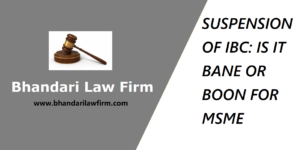Differences & Analysis Between Consumer Protection Act 1986 and Consumer Protection Act 2019
Introduction Consumer Protection Lawyers
Differences & Analysis Between Consumer Protection Act 1986 and Consumer Protection Act 2019 : Consumer Protection Lawyers : The Consumer Protection Act of 2019 received the assent of the President on 9th August, 2019 and will come into force when it is notified by the Central Government, thereby repealing the earlier legislation of the year 1986. Lord Wright commented long back in 1935: “The old rule of caveat emptor had been superseded by caveat venditor, such change being rendered necessary by the conditions of modern commerce and trade.” The new legislation is a step in the same direction which recognises the rights of the consumer and provides timely and effective administration and settlement of consumer disputes and related matters.
The Government instead of bringing an amendment in the 1986 Act, enacted a new Act altogether so as to provide enhanced protection to the consumers taking into consideration the booming e-commerce industry and the modern methods of providing goods and services such as online sales, tele-shopping, direct selling and multi-level marketing in addition to the traditional methods.The new Act proposes a slew of measures and tightens the existing rules to further safeguard consumer rights. Introduction of a central regulator, strict penalties for misleading advertisements and guidelines for e-commerce and electronic service providers are some of the key highlights.
NEW ADDITIONS IN THE CPA 2019 ACT Consumer Protection Lawyers
- Under Section 2 of the act, “advertisement” has been brought under the ambit of the said act, that is, endorsement that is done of goods and services, normally by celebrities, has also been included in the act. An additional onus has been placed on endorsers, apart from producers and service providers, to prevent false or misleading advertisements.
- Under the definition of “consumer”, buying of goods and hiring or availing of services includes offline and online transactions.
- The definition of food has also seen a substantial change and has included “food” as defined in Food Safety and Standards Act, 2006.This would also bring the meteorically rising number of food delivery platforms within the fold of the 2019 Act.
- Interestingly, “telecom” has been added to the definition of “services” to bring telecom service providers within the purview of the 2019 Act. But surprisingly, such inclusion has not been worded as “telecommunication service” defined under the Telecom Regulatory Authority of India Act, which would have included internet, cellular and data services.
- A significant addition to the 2019 Act is the introduction of “product liability” whereby manufacturers and sellers of products or services have been made responsible to compensate for any harm caused to a consumer by defective products, manufactured or sold, or for deficiency in services.
- Another newly introduced concept is that of “unfair contracts” aimed to protect consumers from unilaterally skewed and unreasonable contracts which lean in favour of manufacturers or service providers.
- The definition of “unfair trade practices” has been enlarged to include electronic advertising which is misleading, as well as refusing to take back or withdraw defective goods, or to withdraw or discontinue deficient services, and to refund the consideration within the period stipulated or in the absence of such stipulation, within a period of thirty days. It is now also an offence if any personal information, given in confidence and gathered in the course of a transaction, gets disclosed.
- The New Act proposes the establishment of a regulatory authority known as the Central Consumer Protection Authority (CCPA), with wide powers of enforcement. The CCPA will have an investigation wing, headed by a Director-General, which may conduct inquiry or investigation into consumer law violations.The CCPA has been granted wide powers to take suo-moto actions, recall products, order reimbursement of the price of goods/services, cancel licenses and file class action suits, if a consumer complaint affects more than 1 (one) individual.
- The new act continues to have Consumer Dispute Redressal Commissions at three levels, i.e., National, State and District Level. However, certain changes have been brought therein.
(Click Here To Go On Official website of National Consumer Dispute Redressal Commission)
Firstly, the pecuniary jurisdiction of the National, State and District Commissions has been changed. The District Consumer Disputes Redressal Commission can take up cases where the value of goods and services paid as consideration does not exceed one crore rupees [Section 34(1)], as against 20 lakhs earlier. The State Commission can entertain cases for consideration up to ten crore rupees [Section 47(1)], which was earlier one crore rupees. The pecuniary jurisdiction for the National Commission has been increased to over and above ten crores rupees [Section 58(1)] as against one crore rupees in the 1986 Act.
Consumer Protection Lawyers
Secondly, the 2019 Act now provides an added advantage to the consumers by providing for filing of complaints where the complainant resides or personally works for gain as against the 1986 Act which only provides for filing of complaint where the opposite party resides or carry on business. This would help in removing the difficulties faced by the consumers in seeking redressal of their grievances against businesses who may not have an office or branch in their state.
Thirdly, Alternate Dispute Resolution mechanisms has been introduced in the 2019 act. The Consumer Forum shall refer the matter to mediation of the written consent of both the parties to ensure speedy resolution of disputes. For this purpose, the 2019 Act also provides for establishment of a consumer mediation cell by the respective State Governments in each District Commission and State Commission as well as at the National Commission by the Central Government.
Consumer Protection Lawyers
Fourthly, complaints can now be filed before the District forums electronically but in accordance with the rules [Section 35(2)].
Fifthly, the 2019 Act introduces the power of judicial review, which would allow Consumer Commissions to review their orders, thereby reducing the burden faced on account of appeals being preferred to rectify errors apparent on the face of the record. In stark contrast to the 1986 Act, appeals from the State Commission to the National Commission may now only be made where they involve substantial questions of law. Appeals from the National Commission to the Supreme Court can only be made against complaints which originated in the National Commission.
An Analysis On Consumer Protection Act, 2019 Consumer Protection Lawyers
With the whole world becoming a digital marketplace and the advent of new technologically equipped e-commerce platforms, the definition of Consumer needed to be widened because every single second, we the consumers are entering into a number of virtual contracts. This has led to an increased scope of the rights and liabilities of both the parties, i.e., the buyer and the seller. The chances of consumers’ rights being violated by the sellers have grown manifold.
Keeping in view the changing dimensions of buyer and seller relations, the newly passed Consumer Protection Act, 2019 replaced the three decade old Consumer Protection Act, 1986.
The Consumer Protection Act, 2019 mainly deals with the following:
- Strengthening Consumer Rights By Providing A Mechanism For Redressal Of Complaints
The Consumer Protection Act 2019 enables complainants to file complaints in the jurisdiction where the complainant resides or works. It provides an option to complainants to file the complaints in writing or electronically. It also provides for alternate dispute resolution through mediation, therefore, assisting in effective settlement of disputes.
- Bringing e-commerce under the jurisdiction of authorities
The Consumer Protection Act 2019 gives powers to the Central Government to frame guidelines to prevent unfair trade practices in e-commerce. Acting on the same, draft guidelines have been issued seeking public comments. The guidelines when enacted will apply to business-to-consumer (B2C) e-commerce and will cover both, marketplace and inventory-based models of e-commerce. The guidelines list the general conditions to carry on e-commerce business, liabilities of the e-commerce entity, and liabilities of the seller. The guidelines propose that platforms like Amazon, Flipkart, Snapdeal etc will have to disclose sellers ‘details, such as their address, website, email, etc and other conditions related to refund, exchange, terms of contract and warranty on their website to increase transparency.
The onus of ensuring that no counterfeit products are sold on these platforms will also most likely lie with the companies. If any such product is reported or recognised, the company could be penalised.
(Click Here To Know Status Of Your Consumer Complaint )
- Holding celebrities accountable for false and misleading advertisements of products that they endorse
Consumer Protection Lawyers
Celebrities can be fined up to ₹10 lakh. For repeat offences, this may rise to ₹50 lakh.
CCPA can also prohibit the endorser of a misleading advertisement from endorsing that particular product or service for a period of up to one year. For every subsequent offence, the period of prohibition may extend to three years. However, there are certain exceptions when an endorser will not be held liable for such a penalty.
- Proposal for a Central Consumer Protection Authority (CCPA)to protect and enforce consumers from Unfair Trade Practices
CCPA- a quasi judicial body will regulate matters related to violation of consumer rights, unfair trade practices, and misleading advertisements. Consumer Protection Lawyers
It will mainly carry out the following functions, including:
- inquiring into violations of consumer rights, investigating and launching prosecution at the appropriate forum;
- passing orders to recall goods or withdraw services that are hazardous, reimbursement of the price paid, and discontinuation of the unfair trade practices;
- issuing directions to the concerned trader/ manufacturer/ endorser/ advertiser/ publisher to either discontinue a false or misleading advertisement, or modify it;
- imposing penalties, and;
- issuing safety notices to consumers against unsafe goods and services.
- Proposal For Establishment Of Consumer Disputes Commission
Consumer Disputes Redressal Commissions (CDRCs) will be set up at the district, state, and national levels.
A consumer can file a complaint with CDRCs in relation to:
- Unfair or restrictive trade practices;
- Defective goods or services;
- Overcharging or deceptive charging; and
- The offering of goods or services for sale which may be hazardous to life and safety.
However, complaints against an unfair contract can be filed with only the State and National Appeals from a District CDRC will be heard by the State CDRC.
Appeals from the State CDRC will be heard by the National CDRC.
Final appeal will lie before the Supreme Court.
(Read More About Our Consumer Practice and Cases)
Pecuniary Jurisdiction of Consumer Dispute Redressal Commissions under Consumer Protection Act 2019
- The District CDRC will entertain complaints where value of goods and services does not exceed Rs one crore.
- The State CDRC will entertain complaints when the value is more than Rs one crore but does not exceed Rs 10 crore.
- Complaints with value of goods and services over Rs 10 crore will be entertained by the National CDRC.
- Fixing Product Liability Consumer Protection Lawyers
Product liability means the liability of a product manufacturer, service provider or seller to compensate a consumer for any harm or injury caused by a defective good or deficient service.
To claim compensation, a consumer has to prove any one of the conditions for defect or deficiency which are as follows- Consumer Protection Lawyers
Liability of a Product Manufacturer Consumer Protection Lawyers
- The product contains a manufacturing defect, or
- The product has a defective design, or
- There is a deviation from the manufacturing specifications, or
- The product does not conform to an express warranty given by the manufacturer (even when the manufacturer proves that it was not negligent or fraudulent in making the express warranty for the product), or
- The product does not contain adequate instructions or any warning regarding improper or incorrect usage of correct usage to prevent harm.
Liability of a Service Provider
- Providing services which were faulty, imperfect, deficient or inadequate, or
- Proving inadequate instructions and warning to prevent harm, or
- Providing services which do not conform to the warranty or the terms and conditions mentioned in the contract.
Liabilities of Seller
Liabilities of seller arise if:
- it has exercised substantial control over the designing, testing, manufacturing, packaging or labelling of the product, or
- it altered or modified the product and such alteration or modification was a substantial factor in causing the harm, or
- it has made an express warranty which is independent of the warranty made by a manufacturer and such product failed to conform to such express warranty made by the product seller which caused the harm, or
- the identity of the manufacturer is not known or if known the service of notice or process or warrant cannot be affected on the manufacturer or it the manufacturer is not subject to the law which is force in India, or
- the product seller has failed to exercise reasonable care in assembling, inspecting or maintaining the product or it did not follow the warnings or instructions for the product provided by the manufacturer while selling such product and such failure was the proximate cause of the harm caused to such product.
It also provides for product liability action on account of harm caused to consumers due to defective products or deficient services. Consumer Protection Lawyers
Exceptions to Product Liability Action
A product manufacturer will not be liable under the product liability action in case he fails to provide adequate warnings or instructions, if:
- the product was purchased to be used at a workplace and the product manufacturer had provided warnings to such employer, or
- the product was sold as a component to be used in another product and necessary instructions and warnings had been given by the manufacturer, and the harm was caused to the complainant from the use of the end product, or
- the product was one which was legally meant to be used under the supervision of an expert or a class of experts and the product manufacturer had employed reasonable means to give warnings or instructions for usage to such expert or class of experts, or
- the complainant was under the influence of alcohol or any prescription drug while using the product which was not prescribed a medical practitioner, or
- Such instructions or warnings are obvious or commonly known to a user or a consumer of such product or which the consumer should have known, taking into account the characteristics of such product.
- Unfair trade practices
The Consumer Protection Act 2019 lists three extra practices as unfair trade practices in addition to those already provided.
These are as follows:
- the failure to issue a bill or receipt;
- the refusal to accept goods returned within thirty days; and
- the disclosure of a consumer’s personal information given in confidence (unless required by law or in public interest). Consumer Protection Lawyers
The requirement of protecting a consumer’s personal information is in consonance with the data protection requirements under the Information Technology (Reasonable Security Practices and Procedures and Sensitive Personal Data or Information) Rules, 2011, under which personal information of an individual cannot be disclosed without prior consent, except if required by law.
- Widened scope of Consumer Rights
Under the Consumer Protection Act, 2019 the Consumer Rights have been widened to include:
- To be protected against marketing of goods and services which are hazardous to life and property;
- To be informed of the quality, quantity, potency, purity, standard and price of goods or services;
- To be assured of access to a variety of goods or services at competitive prices; and
- To seek redressal against unfair or restrictive trade practices.
A Comparative Analysis of the Consumer Protection Act, 1986 and the Consumer Protection Act, 2019
- The Consumer Protection Act, 2019 provides for the formation of a separate Consumer Protection Authority whereas, the earlier Act of 1986 didn’t contain this provision.
- Under the 1986 Act, consumer complaint could be filed only where the Seller’s office is located, but under the 2019 Act, complaint can be filed in the Consumer Court where the consumer resides or works.
- Unlike the Consumer Protection Act, 1986, Product Liability has been fixed; the consumer can seek compensation for the harm caused by a product or service under the 2019 Act.
- Pecuniary jurisdiction of the Consumer Dispute Redressal Forums has been increased under the 2019 Act.
- Under the 2019 Act, the rules of Direct Selling have been extended to e-commerce.
- To lessen the burden of courts and to ensure efficiency, courts can refer settlement through Mediation.
Consumer Protection Lawyers
CONCLUSION
With the invention of new modes of business like direct selling, telemarketing, e – commerce, etc, consumers have become more vulnerable to unfair trade practices.The consumer preference is now more tilted towards buying products online bringing about the drastic changes in the traditional definition of the market. With the advent of E-commerce, the consumers and brand owners are working to safeguard their interest in this new world which is susceptible to widespread distribution of counterfeit and infringing products taking cover under the anonymity of online transactions. These modes which were not envisaged three decades later, had to be incorporated in the new Act. Earlier, direct selling and multilevel marketing were regulated through guidelines issued by state governments and the consumer affairs ministry. The new Act bring these activities under its ambit. Therefore, this act is a step towards safeguarding consumers in this dynamically changing environment. Consumer Protection Lawyers
Note: For any further information or any query you may contact us on 9855677966 or via email info@bhandarilawfirm.com



